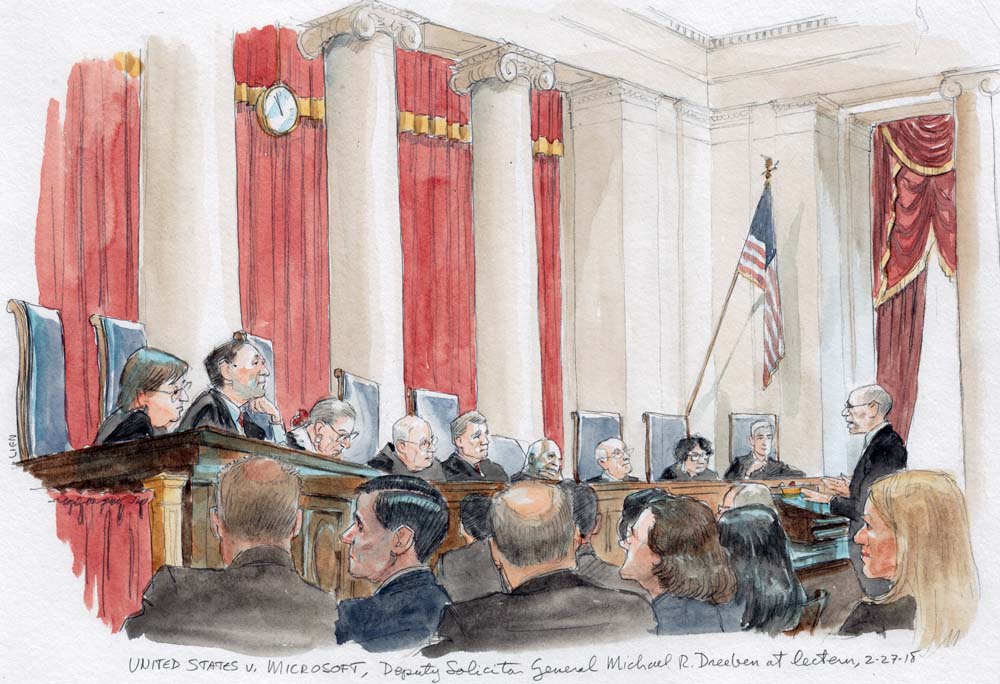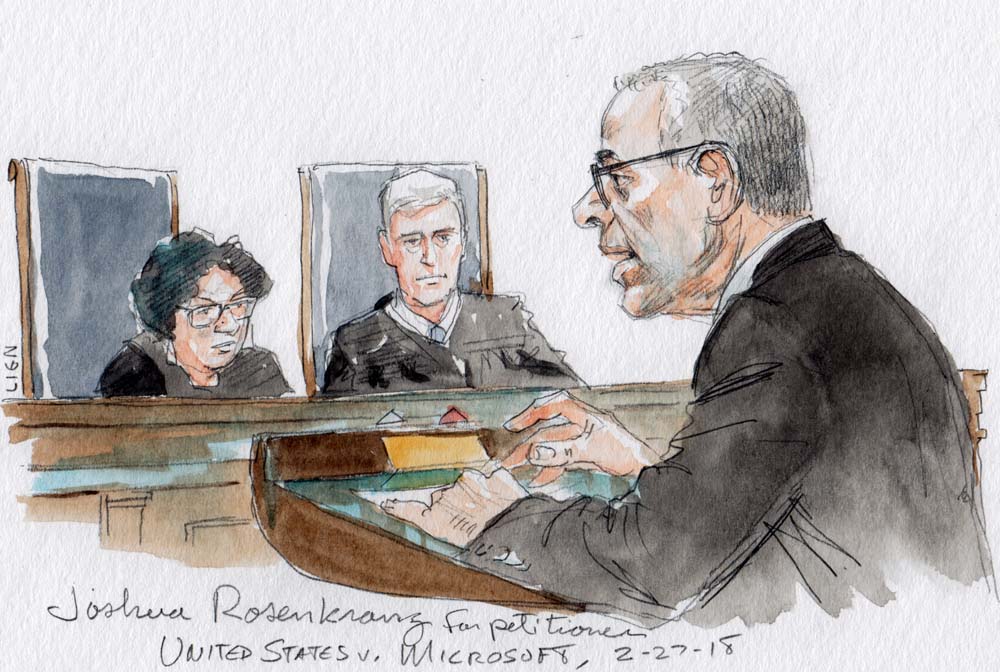Argument analysis: Justices divided over disclosure of overseas emails

on Feb 27, 2018 at 3:51 pm

When the Supreme Court heard oral argument this morning in United States v. Microsoft, it found itself in what has become familiar terrain — trying to apply a decades-old law to modern technology. Today the justices were interpreting what Justice Anthony Kennedy characterized as a “difficult statute”: the Stored Communications Act, a 1986 law that requires an email provider to turn over the contents of emails if the government obtains a warrant. Computer giant Microsoft told the justices today that the SCA only applies within the United States, so the company cannot be compelled to turn over emails stored outside the country. The federal government countered that, although laws don’t normally apply outside the United States, the SCA focuses on “classically domestic conduct”: Here, it stressed, Microsoft is simply being asked to turn over electronic records that it controls, even if those records happen to be stored elsewhere. After struggling with the issues (and the technology) in the case for approximately an hour of oral argument, it wasn’t at all clear how the justices will rule – if they even have the opportunity to do so before Congress enacts legislation that would resolve the case.
The dispute before the court today dates back to December 2013, when the federal government served Microsoft with a warrant at its headquarters in Redmond, Washington. The warrant ordered Microsoft to turn over information for an email account that the government believed was being used for drug trafficking. But Microsoft refused to give the government the contents of the emails, because they were stored in Ireland.

United States v. Microsoft, Deputy Solicitor General Michael Dreeben at lectern (Art Lien)
Chief Justice John Roberts was relatively unsympathetic to the company’s plight. When Joshua Rosenkranz, who argued for Microsoft, explained that the company had complied with earlier disclosure orders but objected once it realized that the disclosure requirement was an “extraterritorial act” for data stored overseas, Roberts chided him for assuming the answer to the question. It’s not the government’s fault that Microsoft has opted to store the data overseas, Roberts emphasized. In fact, Roberts continued, “I suspect the government doesn’t care.” And Roberts later expressed concern that email providers could attract customers by assuring them that their emails would be stored overseas, beyond the reach of the U.S. government.
Justice Samuel Alito seemed to share Roberts’ view. He lamented that, if Microsoft were to prevail, the federal government could show probable cause to obtain information in the emails of a U.S. citizen under investigation for a crime that occurred in the United States, but the government still might not be able to acquire the emails if the email provider has chosen to store them overseas. The only other procedure for getting the emails, Alito noted, would be through the bilateral treaties that the United States has with other countries – which can take many months or years, he observed.
Other justices were more sympathetic to Microsoft’s contention that requiring it to turn over the emails at issue in this case would constitute an application of U.S. law outside the U.S. borders. When Deputy Solicitor General Michael Dreeben, arguing on behalf of the federal government, emphasized that Microsoft’s production of the emails in the United States would be purely domestic conduct, Justice Ruth Bader Ginsburg countered that, before it could turn over the emails in the United States, the company would have to take action in Ireland, where the emails are stored. Justice Neil Gorsuch echoed this sentiment, asking Dreeben why the court wouldn’t consider the fact that some part of the process leading to disclosure of the emails must take place overseas: The information must be collected in Ireland and then sent back to the United States to be disclosed there, Gorsuch noted.

E. Joshua Rosenkranz for respondent (Art Lien)
As I explained in my preview, the Supreme Court is not the only branch of the federal government considering the complex questions at issue in Microsoft’s case. Recently a bipartisan group of senators introduced legislation – known as the CLOUD Act – that would allow warrants for data stored overseas, but would also give both email providers and the countries where the data is stored a chance to object to those disclosures. Ginsburg and Justice Sonia Sotomayor seemed to believe that Congress, rather than the Supreme Court, was best suited to deal with the questions before the court. Sotomayor told Dreeben that, when it enacted the SCA, Congress was only trying to protect data stored in the United States. What the government is asking the Supreme Court to do now, she continued, is to imagine how Congress would deal with disclosures of overseas data if it considered the question. Given the prospect that the court’s ruling could create conflicts with other countries’ laws and, as a result, foreign-relations problems, she asked, why shouldn’t the justices leave things as they are and let Congress change the law if it wants to do so?
Dreeben pushed back hard against Sotomayor’s suggestion that a ruling for the government could create international problems, calling the idea a “mirage” that Microsoft has created. No foreign government has told the courts or the U.S. government that requiring disclosures like the one in this case would conflict with their laws, he assured Sotomayor. But, he emphasized, since the ruling by the U.S. Court of Appeals for the 2nd Circuit for Microsoft, foreign governments have complained about problems that they have experienced when they come to U.S. courts in an effort to get information from U.S. providers to enforce their own laws. And in any event, he continued, the job of the Supreme Court is to interpret the law, “rather than waiting for an uncertain legislative process.”
Justice Stephen Breyer proposed what he described as a “practical” solution to the problem facing the court: The federal government could, as a general rule, get a warrant to obtain data stored overseas, but companies like Microsoft would have the opportunity to go before a judge to raise potential problems – such as a conflict with foreign law – and the judge could consider those problems in deciding whether to enforce the warrant. Breyer may have been hoping to appeal to Justices Anthony Kennedy and Elena Kagan, both of whom seemed unsatisfied with what Kennedy characterized as the stark “binary” choice facing the court. Although Dreeben appeared amenable to Breyer’s proposal, Rosenkranz was decidedly unenthusiastic, arguing that the justices’ job is to interpret the law that Congress wrote, rather than “innovating and adopting its own standard.”
Will at least four other justices be more open to Breyer’s “practical” solution? We will likely know by the end of June – assuming, of course, that Congress doesn’t act first.
This post was originally published at Howe on the Court.
[Disclosure: Goldstein & Russell, P.C., whose attorneys contribute to this blog in various capacities, is among the counsel on an amicus brief in support of the respondent in this case. The author of this post, however, is not affiliated with the firm.]


